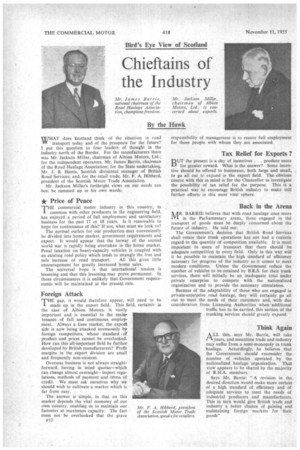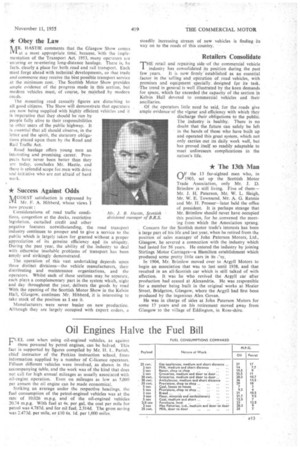Chieftains of the Industry
Page 126

Page 127

If you've noticed an error in this article please click here to report it so we can fix it.
By the Hawk
WHAT does cotland think of the situation in road transport today and of the prospects for the future? I put this question to four leaders of thought in the industry north of the Border. For the manufacturers there was Mr. Jackson Millar, chairman of Albion Motors, Ltd.; for the independent operators, Mr. James Barrie, chairman of the Road Haulage Association; for the State undertaking. Mr.. J. B. Hastic, Scottish divisional manager of British Road Services; and, for the retail trade, Mr. F. A. Bibberd, president of the Scottish Motor Trade Association.
Mr. Jackson Millar's forthright views on our needs can best be summed up in his own words:
* Price of Peace
THE commercial motor industry in this country, in common with other producers in the engineering field, has enjoyed a period of full employment and satisfactory business for the past 17 or 18 years. Is it reasonable to hope for continuance of this? If not, what must we look to?
The normal outlets for our production may conveniently be divided into home market, government requirements and export. It would appear that the leeway of the second world war is rapidly being overtaken in the home market. Penal taxation On heavy-capacity vehicles is coupled with an existing road policy which tends to strangle the free and safe increase of road transport. All this gives little encouragement for greatly increased home sates. The universal hope is that international tension is lessening and that this lessening may prove permanent. In those circumstances it is unlikely that Government requirements will be maintained at the present rate.
Foreign Attack
THE gap, it would therefore appear, will need to made up in the export field. This field, certainly the case of .Albion Motors, is vastly important and is essential to the maintenance of full and continuous employment. Always a keen market, the export side is now being attacked strenuously by foreign competitors, whose standard , of product and prices cannot be overlooked. How can this all-important field be further developed by British manufacturers? Profit margins in the export division are small and frequently non-existent.
Overseas business is not always straightforward, having in mind quotas—which can change almost overnight—import regulations, methods of payment and terms of credit. We must ask ourselves why we should wish to cultivate a market which is far from easy. .
The answer is simple, in that on this market depends the vital economy of our own country, enabling us to maintain our factories at maximum capacity. The fact must not be overlooked that the grave Fl 2 responsibility of management is to ensure full employment for those people with whom they are associated.
Tax Relief for Exports ?
BUT the present is a day of incentives . . . produce more for greater reward. What is the answer? Some incentive should be offered to businesses, both large and small, to go all out to expand in the export field. The obvious course with this in mind is for the Chancellor to investigate the possibility of tax relief for the purpose. This is a practical way to encourage British industry to make still further efforts in this most vital sphere.
Back in the Arena
mR. BARRIE believes that with road haulage once more in the Parliamentary arena, those engaged in the transport of goods must be deeply concerned about the future of industry. He told me:
The Government's decision that British Road Services shall retain their trunk operations has not had a realistic regard to the quantity of competition available. It is most important to users of transport that there should be adequate competition in every field. Only in this way will it be possible to maintain the high standard of efficiency necessary for progress of the industry as it comes to meet. modern conditions. Unless the Government reduce the number of vehicles to be retained by B.R.S. for their trunk services, there will initially be an, inadequate total under private enterprise to compete with the nationalized organization and to provide the necessary stimulation.
Because of the adaptability of those who are engaged in private-enterprise road haulage, they will certainly go all out to meet the needs of their customers and, with due consideration. from Licensing Authorities when additional traffic has to be carried, this section of the trunking services should greatly expand.
Think Again
ALL this, says Mr. Barrie, will take years, and meantime trade and industry may suffer from a semi-monopoly in trunk haulage. Accordingly, he believes that the Government should reconsider the number of =vehicles operated by the nationalized haulage organization. That view appears to be shared by the majority of R.H.A. members.
Says. Mr. Barrie: "A revision in the desired direction would make more certain of a high standard of efficiency and of adequate services to meet the needs of industrial producers and manufacturers. This in turn would give British trade and industry a better chance of gaining and maintaining foreign markets for their • goods"
-* Obey the Law
AAR. HASTIE comments that the Glasgow Show comes
at a most appropriate tirne, because, with the implementation of the Transport Act, 1953, many operators are entering or re-entering long-distance haulage. There is, he feels, clearly a place for both road and rail transport. Each must forge ahead with technical developments, so that trade and commerce may receive the best possible transport service at the minimum cost._ The Scottish Motor Show provides ample evidence of the progress made in this section, but modern vehicles must,of course, be matched by modern
The mounting road casualty figures are disturbing to all good citizens. The Show will demonstrate that operators are now being supplied with highly efficient vehicles and it is imperative that they should be runby people fully alive to their responsibilities to other users of the public highway. It is essential -that all should observe, in the letter and the spirit, the statutoryobligations placed upon them by the Road and Rail Traffic Act.
Road haulage offers young men an ink resting and promising career. Prospects have never been better than they are today, concludes Mr. Hastie, and there is splendid scope for men with drive and initiative who are not afraid of hard work.
* Success Against Odds
MODEST satisfaction is expressed by In Mr. F. A. Hibberd, whose views I now present
Considerations of road traffic conditions, congestion at the docks, restrictive legislation, curtailed credit and other negative features notwithstanding, the road transport industry continues to prosper and to give a service to the public which is largely taken for granted without a proper appreciation of its genuine efficiency ap,c1 its ubiquity. During the past year, the ability of the industry to deal with otherwise insoluble problems of transport has been amply and strikingly demonstrated.
The operation of this vast undertaking depends upon three distinct divisions—the vehicle manufacturers, their distributing and maintenance organizations, and the operators. Whilst each of these sections may. be separate, each plays a complementary part in the system which, night and day throughout the year, delivers the goods by road 'With the opening of the Scottish Motor Show in the Kelvin Hall, Glasgow, continues Mr. Hibberd, it is interesting to take stock of the position as I see it.
Manufacturers were never busier on new production. Although they are largely occupied with export orders, a
steadily increasing stream of new vehicles is finding its way on to the roads of this country.
Retailers Consolidate
THE retail and repairing side ..of the commercial vehicle .industry has consolidated its position during the past few years. It is now firmly–established as an essential factor in the 'selling and operation of road vehicles, with premises and equipment specially, designed for it task. The trend in general is well illustrated by the keen demands for space, which far exceeded the capacity of the section in Kelvin Hall devoted to commercial Vehicles and their ancillaries.
Of the operators little need be said, for the roads give ample evidenceof the vigour and efficiency with which they discharge their obligations to the public. The industry is healthy. There is no doubt that the future can safely be left in the hands of those who have built up and operated this great system, which not only carries out its daily work well, but has proved, itself so readily adaptable to meet unforeseen complications in the nation's life.
* The 13th Man
OF the 13 far-sighted men who, in 1903, set up the Scottish Motor Trade Association, only Mr. J. D. Brimlow is still living. Five of them— Mr. J. H. Paterson, Mr, W. L. Sleigh, Mr. W. E. Townsend, Mr. A. G. Rennie and Mr. H. Prosser—later held the office of president. It .is perhaps strange that Mr. Brimlow should never have occupied this position, for he.convened the meet ing from which the Association sprang. , Concern for the Scottish motor trade's interests has been a large part of his life and last year, when he retired from the position of sales manager of John Paterson Motors, Ltd., Glasgow, he severed a connection with the industry which had lasted for 56 years. He entered the industry by joining Stirlings Motor Carriages—a Hamilton establishment which produced some pretty little cars in its ,'ay.
In .1904, Mr. Brimlow moved over to Argyll Motors to begin an association that was to last until 1938, and that resulted in an all-Scottish car which is still talked of with affection. It was he who revived the Argyll car after production had ceased at Alexandria. He was responsible for a number being built in the original works at Hozier Street, Bridgeton, Glasgow, where the Argyll had first been produced by the ingenious Alex Govan.
He was in charge of sales at John Paterson Motors for some 17 years and on his retirement moved away from Glasgow to the village of Eddington, in Ross-shire.
































































































































































































































































































